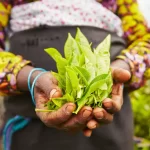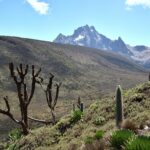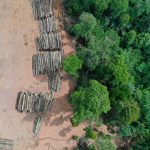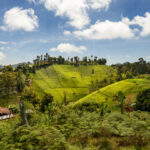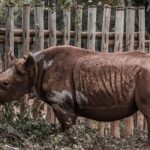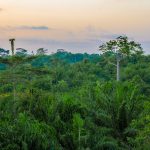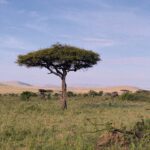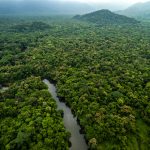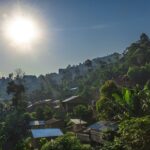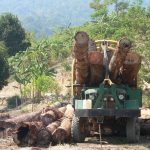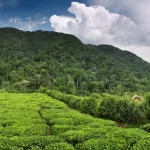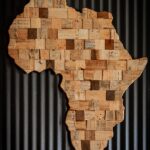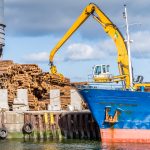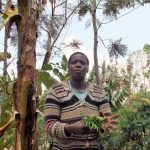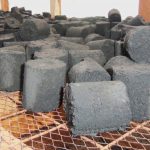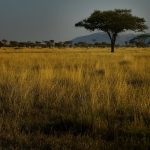Timber
Other Forest-Risk Commodities

In East Africa, a lack of border controls and widespread fraud facilitate the illegal timber trade. In the outdoor workshops, carpenters make stylish, solid mahogany furniture for wealthy customers. It is termite-resistant and built to last. However, behind this polished furniture and finely carved chairs lies a significant problem: opaque supply chains, uncontrolled borders, and logging operations stretching over a thousand kilometers into the center of the Democratic Republic of the Congo (DRC).
Anthony Muchui, a furniture store manager on Ngong Road since 2018, explains:Almost all the mahogany here comes from the Congo. It’s durable, impact-resistant, and has a stunning finish. Muchui estimates that his business uses around 30 tons of mahogany every month or two.
The timber arrives via agents who obtain permits from the DR Congolese and Ugandan authorities. Once in Kenya, truck drivers present documents from the DRC, tax forms from the Kenya Revenue Authority (KRA), and their identity cards. However, Muchui admits that not all the timber is “legal.”
In eastern DRC, logging mainly occurs in the provinces of Ituri (in the east, close to the border with Uganda), Bas-Uélé (in the north), and Tshopo (mid-northeast). These border regions have become logging operation gold mines in North Kivu and Ituri. Justin Malekani, a former logging operations manager turned carpenter in Butembo, explains: Local leaders sell access to trees. We pay the ‘Kingiyapoli’ (a type of access fee), typically involving a goat and some beer. We hire forest people as guides as they know the forest best.
Although legal operations require permits from the National Forestry Fund (FFN) and demarcation from the environment service, many sidestep these requirements. An anonymous source said:Fraud makes things too easy. If we register our companies, we’ll go bust due to bureaucracy. Going it alone is better.
Timber exporters go through complicated processes at the Kasindi border post between the DRC and Uganda. Before the trucks are even loaded, they must pay the Congolese Control Office (OCC), the National Intelligence Agency (ANR), and other agencies between USD 1,000 and USD 1,200.
At the Busia border post in Kenya, KRA and Kenya Forest Service (KFS) officials review the certificates of origin and transit documentation. However, some shipments bypass official controls.
Experts argue that protecting the Congo Basin requires a regional solution. With forests already depleted in Kenya, Uganda, and Tanzania, demand has shifted to the DRC.
The Kenyan government says ethical certification is adding financial strain on smallholders rather than being paid by customers. A recent Fairtrade Foundation poll found only one in five tea workers and farmers in Kenya are earning enough each month to support their families with essentials.
The cost of certification depends on factors such as farm size, with growers often grouping together. For a smallholder-managed tea factory the annual cost is estimated to be about $3,000. This could come down however as a streamlined process that cuts the preparation work involved in an audit is being introduced this year.
By 2040, climate change and human activities are expected to result in the loss of 49-55 per cent of the vegetation cover in the forest regions of Mount Kenya, according to a new study published in the journal Springer Nature on May 06, 2025.
Kenya’s Environment Secretary was presented with evidence of Chinese firms illegal logging.
The government has proposed to introduce new regulations aimed at streamlining the timber industry by tightening control over exports, imports, and the grading of forest products. The policies outlined in the Forest Conservation and Management (Export and Import) Rules, 2025, and the Forest Conservation and Management (Grading and Valuation) Regulations, 2025, are expected to impact timber prices, trade, and supply chains across the country.
Under the proposed regulations, traders and exporters must obtain permits from the Kenya Forest Service (KFS) before transporting timber. Exporters are also required to present a grading certificate, proving that their timber meets specified quality standards.
Kenya imports a notable portion of its timber from neighbouring countries, particularly the Democratic Republic of Congo (DRC) and Tanzania. With the demand for timber rising due to construction and manufacturing, imports from these countries have become crucial to bridging the supply gap.
However, the proposed rules introduce stricter documentation requirements for imported timber, ensuring the traceability and legality of forest products entering the country. The changes are expected to affect timber prices both locally and internationally.
Kenya exports timber to various markets, including the Middle East, Europe, and Asia. With the proposed regulations, exporters will need to provide proof of origin, grading certificates, and compliance with Kenya Revenue Authority (KRA) tax requirements.
Operation Thunder 2024 (11 November – 6 December) brought together police, customs, border control, forestry and wildlife officials from 138 countries and regions. Authorities arrested 365 suspects and identified six transnational criminal networks suspected of trafficking animals and plants protected by the Convention on International Trade in Endangered Species of Wild Fauna and Flora (CITES).
Timber cases represent the most significant seizures, primarily occurring in sea cargo container shipments, while most other seizures took place at airports and mail processing hubs. More than 49,000 pieces, 214.9 tonnes, or 1340 cubic meters were seized. Significant seizures included:
- Indonesia: 134 tonnes of timber headed to Asia via ocean freight.
- Kenya: 41 tonnes of exotic timber headed to Asia via ocean freight.
The participation of numerous countries contributed to the success of intelligence efforts in the operations, targeting high-value suspects. Authorities investigated online activities and found suspects using multiple profiles and linked accounts across social media platforms and marketplaces to expand their reach.
Kleptocrats on the continent are profiting from the illicit forestry trade, which is estimated by Interpol and the United Nations Environment Programme to be worth $51 billion to $152 billion annually. Short summaries of the issue provided for DRC, Mozambique, Zambia, Equatorial Guinea, Namibia, Zimbabwe, Gabon, Tanzania, Kenya.
The author of this article is encouraging a debate on monitoring and reporting challenges on Kenya’s forest cover. The author argues that Despite ongoing deforestation, reports continue to show increasing forest cover. KFS and DRSSRS rely on outdated data collection methods, depending on manual surveys rather than modern satellite-based systems. This makes it easier to manipulate data or selectively report, often overlooking deforestation hotspots.
Next to the world-famous Maasai Mara national reserve, an indigenous forest called Nyekweri serves as a sanctuary for elephants, rare birds such as the bright green Schalow’s turaco, a small nocturnal mammal called the tree hyrax and the endangered giant pangolin. Originally, it spanned 500km² but more than 50% of this forest has been cleared within two decades by local communities.
During the recent subdivision of the Maasai group ranches in the Trans Mara district, families were allocated parcels within the forest ranging between 12 to 36 acres in size. This gives them the right to do what they wish with the land they now own. Beforehand, the forest was communally owned and managed. Now, many new landowners are clearing the forest to make space for settlements, livestock and farmland. Human-wildlife conflict has increased as people take over land in the elephants’ habitat.
The Team Europe Initiative (TEI) supports capacity building and provides technical support on traceability
systems, geolocalisation and legality to partner countries, through a specialized Technical Facility and
programmes such as SAFE and AL-INVEST Verde. TEI programmes are active in Brazil, Colombia, Democratic
Republic of the Congo, Ecuador, Ethiopia, Indonesia, Kenya, Nigeria, Peru, Tanzania and Zambia. Burundi will
soon join the SAFE programme.
China (and India) are now targeting Kenya and its 100,000-plus hectares of Blue Gum tree plantations, fueling a new wave of timber plants that are now processing veneers.
An anti-poaching unit in Kenya’s Aberdare National Park employs former poachers from the local community to curb wildlife crime and promote conservation. The article includes a small mention of the illegal trade of sandalwood.
Farmers and crime syndicates, driven by high demand and lucrative profits, have cleared vast tracts of land to grow bhang and food crops. For years, bhang farming has often been associated with semi-arid areas like the shorezs of Lake Victoria and the eastern slopes of Mount Kenya. However, recent events have uncovered the expansive plantations established deep within protected forests, areas typically reserved for wildlife conservation and biodiversity preservation.
The Kenya Forest Service (KFS) has embraced technology to detect illegal logging and fire incidents that cause deforestation. Kilifi KFS conservator Elvis Fondo said they are using satellite images to monitor forests. Speaking at Msumarini Primary School in Kilifi South Sub County, Fondo disclosed that the satellite tracking issues alert on logging or other illegal activities in forests.
Kenya is a key market of illegally logged timber, consuming as many as 300 trucks of timber monthly from the forests of the Democratic Republic of Congo.
Kenyan dealers are a common feature in Lia, a border point on the Uganda-DRC frontier, where timber with questionable, if any, documents passes into Uganda en route to Kenya. As much as 80% of timber that arrives at Lia is destined for Kenya, a person working at the border said in an interview.
Official statistics The Africa Report received from the Kenya Revenue Authority (KRA) reflect timber volumes entering the country. KRA statistics indicate that 145,479 tonnes of timber, or 468,924m3, entered Kenya between January 2020 and December 2022.
Though KRA does not detail the species, the UN Comtrade database does. Timber imported into Kenya was declared as mahogany except for 624 tonnes of Afzelia africana and 6.6 tonnes of iroko, or African teak. Afzelia africana, also sometimes called African mahogany, was listed as an endangered species in the Convention on International Trade in Endangered Species of Wild Fauna and Flora (CITES) in 2022.
According to official data, roughly 132 tonnes, or four trucks, were entering Kenya daily between 2020 and 2022, which is less than half of what Uganda traders on the border witness.
For at least 25 years, high-ranking Ugandan officials have turned a blind eye to pillaging hardwood from the Congo Basin in the DRC, according to the UN. The illegal, and rampant, deforestation continues as a small village turns into a timber station.
This is the first article in a four-part investigation into a Congolese wood trafficking hub on the border of Uganda. It reveals a burgeoning trade and an open secret.
This series was produced in partnership with the Pulitzer Center Rainforest Investigations Network.
Criminals in East Africa are exploiting the multiple conflicts in the north-east of the DRC to allow the trafficking of its protected hardwoods.
The key economies in the East African Community – Kenya, Rwanda, Tanzania and Uganda – are all benefiting from this timber trafficking and flagrantly breaking their environmental pledges. The illicit trade is facilitated by ‘big men’ close to security services and politicians across the region – they ensure the border controls fail.
Corrupt payments by the loggers and truckers to border checkpoints oil the wheels of the trade, where fake certificates of origin are produced for a large fee.
As global tea demand grows by over 2% annually, the pressure on land for cultivation may lead to increased deforestation and greenhouse gas emissions, further intensifying the impacts of climate change. Once tea is plucked it must go through various stages of processing, including withering and drying: energy-intensive processes that often use vast amounts of wood or, in some cases, fossil fuels such as coal. This not only results in CO2 emissions, but also has the potential for “hidden deforestation” for wood to burn.
The first high-resolution (5 m) and continental-scale
mapping of land use following deforestation in Africa, including humid and dry forests.
Results show, not surprisingly, that the causes of forest loss vary by region. In general, small-scale cropland is the
dominant driver of forest loss in Africa, with hotspots in Madagascar and DRC. In addition, commodity
crops such as cacao, oil palm, and rubber are the dominant drivers of forest loss in the humid forests of
western and central Africa, forming an “arc of commodity crops” in that region. At the same time, the
hotspots for cashew are found to increasingly dominate in the dry forests of both western and southeastern Africa, while larger hotspots for large-scale croplands were found in Nigeria and Zambia.
A new report by Friedrich Naumann Foundation for Freedom has explored the detrimental impacts of these unsustainable practices on the environment, local communities, and the economy.
Illegal logging, charcoal burning, and firewood trade in Kenya remain one of the major challenges in a bid to improve forest cover.
Kenya’s government is illegally evicting hunter-gatherers from their ancestral lands to profit from carbon offsetting schemes, human rights lawyers say.
Hundreds of members of the Ogiek community are being evicted from the Mau Forest, say their representatives.
Ogiek leader Daniel Kobei said armed forest rangers were “pulling down the houses with axes and hammers”.
Kenya’s government says such operations are to protect the environment.
Long-running tensions between the community and the Kenyan government resurfaced this month when rangers from Kenya’s wildlife and forest services began forcing the Ogiek out of their homes in the Mau forest. Community leaders estimate roughly 400 houses have been demolished, leaving families displaced or seeking shelter from recent rains in makeshift structures.
New satellite data shows ongoing tree cover loss in Kenya’s largest water catchment, the Mau Forest, despite protection efforts.
More than 19% of tree cover was lost between 2001 and 2022, mostly due to agriculture.
Unclear boundaries and limited enforcement allow illegal logging and agricultural expansion to continue, degrading protected reserves.
Environment and Lands Court has declared President William Ruto’s directive to allow logging in forests across the country illegal and unconstitutional.
In a judgment issued by Justice Oscar Angote yesterday, the court concurred with the Law Society of Kenya (LSK) arguments that Ruto’s order that lifted a countrywide ban on logging was done illegally without following the due process because public participation was not conducted.
Environment CS Soipan Tuya has announced the purge against illegal loggers will proceed as planned. “We have come to witness the Chief Conservator of Forests issue show case letters and taking of disciplinary steps for forest officers who have been under investigation over the past months following intelligence reports,” Tuya said.
Ruto pointed to reports of rampant illegal logging, encroachment and other related illegal activities, some of which he stated are being aided and abetted by the KFS management and staff.
Kenya’s Environment and Land Court (ELC) August 3, 2023 issued interim orders against the policy directive by President William Ruto in July 2023 lifting a moratorium on logging pending the hearing and determination of the case.
q
The court ordered a 14-day stay on President Ruto’s repeal of a logging moratorium introduced in 2018 to curb the rapid disappearance of forests.
African foresters want a change in government policies to allow easier trade in timber, taking advantage of available forests and to weed out exploitative trade routes.
They argue that archaic laws are, in fact, fuelling illegal harvesting and sale of trees which in turn cause losses to revenue agencies.
Studies commissioned by the African Forest Forum revealed that Africa’s export challenges in the forestry sector are complex.
The research papers uncovered a scarcity of documented trade data on forest products occurring between borders, for example.
They showed that the quantities and sales remain unknown, highlighting the concealed opportunity for governments to generate significant revenue.
According to Dr Cheboiwo, efforts have been made to condemn illegal logging activities, but less attention has been given towards implementing reforms.
It was the news Kenya’s timber industry had waited over five years to hear: a ban on logging was over, and the country’s forests were once again open for business. But conservationists were dismayed at the announcement in July by President William Ruto, who had cast himself as a champion of the environment, and made planting 15 billion trees a centerpiece of his climate change agenda. The government defended lifting the ban, insisting that only mature trees in state-run plantations would be felled, and that Kenya’s most biodiverse and carbon-rich wild forests would remain untouched.
The explanation did little to quash charges of hypocrisy, with Ruto just weeks away from hosting a international climate conference in Nairobi.
Kenyan President William Ruto announced Sunday the lifting of a near six-year ban on logging, despite the concerns of environmental campaigners.
Ruto said the move was “long overdue” and was aimed at creating jobs and opening up sectors of the economy that rely on forest products. The moratorium was imposed by the previous government in February 2018 in public and community forests with the aim of stamping out rampant illegal logging and increasing the nation’s forest cover to 10 percent.
Environment Cabinet Secretary Soipan Tuya has ordered the Kenya Forest Service to mount a nationwide crackdown on illegal logging, encroachment and charcoal burning, which she blamed for the recent spike in forest fires.
Speaking on Friday at a press briefing, CS Tuya cautioned communities living adjacent to public forests against engaging in illegal forest activities and asked them to be the first line of defence for Kenya’s forests.
Drawing from Center fro Africa Strategic Stiudies recent report, which is based on recent research and programmatic work at the Africa Center for Strategic Studies, we have analyzed three ways that illegal logging affects national security and what that means for current measures to counter it.
Ugandan President Yoweri Museveni and local leaders have banned the charcoal trade, but in a country with a booming population, and where only 1.7 million of about eight million households are connected to grid electricity, charcoal for cooking is too precious.
A politician recently launched a campaign against the runaway illegal charcoal trade in the region, and a growing number of local and anti-charcoal vigilantes are emerging to enforce bans on the trade.
The Acholi region, where Gulu is, currently supplies a considerable chunk of the charcoal consumed in Uganda cities such as Kampala. Ugandan charcoal is also in big demand in Kenya, and a lucrative legal and illegal cross-border trade in the commodity thrives.
Illegal logging is a growing feature of transnational organized crime in Africa, often facilitated by the collusion of senior officials, with far-reaching security and environmental implications for the countries affected.
Forest fires, drought, logging and encroachment have been cited as some of the challenges that have hampered the achievement of 10 per cent tree cover in the country. Kenya Wildlife Service senior assistant director in charge of the mountain conservation area George Nagwala on Friday said the Aberdare ecosystem is coming out of a very serious fire season.
Lari — Forest authorities say Kenya’s scheme to let farmers grow crops in forests has slashed illegal logging, as the country aims for 10% of its land in trees by the end of the year
Kenya wants to increase tree cover from 7% to 10% by end of year
Farmers in forests make extra income, drive off illegal loggers
Some farmers are frustrated by limits on what they can grow
In November, a Kenyan court ordered the release of 646 metric tons of Malagasy rosewood (Dalbergia spp.), worth up to $13 million, to a Hong Kong-based company from which it had been seized in 2014 by Kenyan authorities.
The Zanzibar Declaration on Illegal Logging, signed on Wednesday at a global gathering on forests in South Africa, aims to improve communication between customs authorities and collaboration among forest officials from the east and southeast African nations.
Kenya loses around $10 million annually due to the illegal cross-border wood trade with Tanzania, while Tanzania loses more than $8 million, according to studies cited by the World Wildlife Fund (WWF), a green group backing the new agreement.
Click here to access the Global Illegal Logging and Associated Trade (ILAT) Risk assessment tool and to download the Forest Trends User Guide describing the functionality of the ILAT Risk Data Tool.
Click here to access the Cattle Data Tool.


